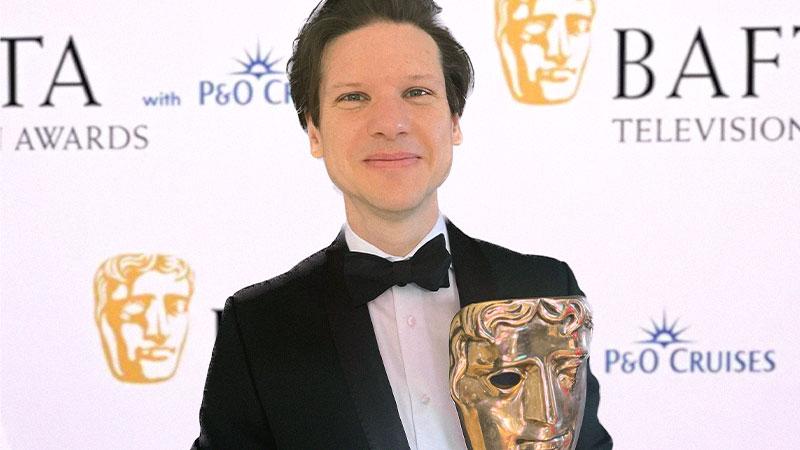University of Westminster Film and Television Production BA Honours alumnus David Thompson has won a BAFTA for best Single Documentary for his work on Ellie Simmonds: Finding My Secret Family. Now looking towards the future, he speaks about his experience as part of a BAFTA-winning production team and how his student days helped propel him into the world of documentary filmmaking.

How did it feel to win the BAFTA?
It felt great. I wasn’t expecting it at all, so it all felt surreal to actually win it. We were all in a bit of a daze going up on the stage, it was all a bit dream-like to be honest.
How did you get involved in this documentary?
It was through a recommendation. I had worked on a Stacey Dooley documentary in Brighton during Covid and the director of that project passed on my details to her friend who was about to start filming the Ellie doc. But at that time it was all kind of a secret about what it was because at that point very few people knew that Ellie Simmonds was adopted. I really loved the story as it really taps into powerful themes and powerful ideas and so was very excited to get involved.
What was it like being part of the production team?
Because I was editing I did not actually meet Ellie until after we went on stage at the BAFTAs but that is what it is like as an Editor, you spend months and months with people’s faces on your screen and they have no idea who you are.
It was an interesting edit because it went on for quite a long time because we were following the story as it happened. So we had a month of editing and then some time off and then a few more weeks of editing. We were all sort of living it and had no idea at all about how it would turn out. As we were editing, we didn’t know what direction the story was going to go in, who in her family was she going to be able to be reconnected with and who might be willing to meet her so we were very much finding out what would happen in the documentary with her.
What drew you to work on this documentary?
As soon as I heard about this one it really felt like it would resonate with a lot of people. I like anything that is very specific but also very universal. It’s specific because it’s about being a Paralympian and having Dwarfism, which are things so particular to Ellie, but at the same time highlights the idea of being rejected for something about yourself that you just cannot change. And that’s something many people feel about aspects of themselves, and it really resonates with me. Going forward this is what I am looking for – stories that really tap into something about us all.
What was your favourite part of the documentary?
My favourite part of the documentary would be where Ellie phones up the children of the foster mother who cared for her for a few months when she was just a baby. The foster mother had recently died but her daughter said that when the mother had seen Ellie in the Olympics in 2012, she recognised her as the baby she’d taken in, and wanted to get in touch but didn’t want to intrude. That is the first time in the film where Ellie really cries. When we were looking at this moment in the rushes, we knew we would need to structure the scenes before it so that the audience really understands why she is crying. She is not just crying about missing the chance to connect with her foster mother, there are a lot of other emotions going on underneath and this is the first time she lets them out so that was very moving.
How did studying at the University of Westminster help your career?
All the technical training and the filmmaking available on the course is absolutely great, but the biggest thing I would say is having the opportunity to work with people that are going to be great connections for you in the future. They’re not just great connections because you know them, they are great because they have seen you work. I found in the industry that is how I have gone from job to job. When people have been in the room with you while you’re working, they know that they can trust you.
The first documentary I ever did came about because another graduate from the course who was working for a US company had a deadline of two weeks to finish a project and they needed an extra pair of hands. He had worked with me in person at Westminster so knew I would work hard and do a good job on it.
From there I started getting a lot of freelance work and that was how I fell into documentaries, so if it hadn’t been for that connection with that person on the course, I’m not sure I would have ever gone down this path at all.
What advice would you give to future filmmakers?
Try to do your best work even on rubbish jobs - someone on the team might remember you for a really interesting project down the road. And for editors: get emotional about your rushes. If it makes you well up, or tense, or smile, remember that feeling and build around those moments to recreate it for the audience.
Find out more about Film and Television courses at the University of Westminster.


